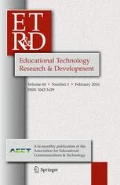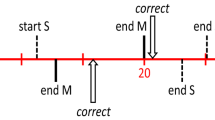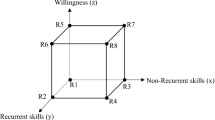Abstract
This multiple-case study examined how advanced learners solved a complex problem, focusing on how their frequency and application of cognitive processes contributed to differences in performance outcomes, and developing a mental model of a problem. Fifteen graduate students with backgrounds related to the problem context participated in the study. Data sources included direct observation of solution operations, participants’ think aloud and stimulated recalls as they solved the problem, as well as solution scores indicating how well each participant solved the problem. A grounded theory approach was used to analyze stimulated recall and think aloud data. A set of thirteen cognitive processes emerged in the coding and were tallied for each participant. Individual cases were then grouped into clusters that shared similar frequencies of prior knowledge activation, performance outcomes, and tool use behaviors. Each cluster was profiled from least to most successful with descriptive accounts of each cluster’s approach to solving the problem. A cross cluster analysis indicated how learners’ cognitive processes corresponded with problem solving operations that revealed thresholds of knowledge development and formed an integrated mental model of the problem. The findings suggested that mastering problem solving operations within each threshold enhanced the learners’ conceptual awareness of where to apply cognitive processes and increased the combinations of cognitive processes they activated at higher thresholds of knowledge development. The findings have implications for anticipating where novices need support within each threshold of knowledge development during complex problem solving.





Similar content being viewed by others
References
Alibali, M. W., Phillips, K. M. O., & Fischer, A. D. (2009). Learning new problem-solving strategies leads to changes in problem representation. Cognitive Development, 24(2), 89–101. doi:10.1016/j.cogdev.2008.12.005.
Anderson, J. R. (2009). Expertise. In Cognitive psychology and its implications (7th ed., pp. 242–271). New York: W. H. Freeman.
Anderson, L. W., & Krathwohl, D. R. (2001). A taxonomy learning, teaching, and assessing: A revision of Bloom’s taxonomy of educational objectives. New York: Longman.
Azevedo, R., & Hadwin, A. (2005, November). Scaffolding self-regulated learning and metacognition: Implications for the design of computer-based scaffolds. Instructional Science, 33(5), 367–379. doi:10.1007/s11251-005-1272-9.
Bannert, M., & Reimann, P. (2011). Supporting self-regulated hypermedia learning through prompts. Instructional Science, 40(1), 193–211.
Belland, B. (2010). Portraits of middle school students constructing evidence-based arguments during problem-based learning: The impact of computer-based scaffolds. Educational Technology Research and Development, 58(3), 285–309. doi:10.1007/s11423-009-9139-4.
Belland, B., Glazewski, K., & Richardson, J. (2011). Problem-based learning and argumentation: Testing a scaffolding framework to support middle school students’ creation of evidence-based arguments. Instructional Science, 39(5), 667–694. doi:10.1007/s11251-010-9148-z.
Bixler, B. A., & Land, S. M. (2010). Supporting college students’ ill-structured problem solving in a web-based learning environment. Journal of Educational Technology Systems, 39(1), 3–15. doi:10.2190/ET.39.1.b.
Bloom, B. S., Englehart, M. B., Furst, E. J., Hill, W. H., & Krathwohl, D. R. (1956). Taxonomy of educational objectives, the classification of educational goals: Handbook I—Cognitive Domain. New York: McKay.
Borkowski, J. G., Johnston, M. B., & Reid, M. K. (1987). Metacognition, motivation, and controlled performance. In S. J. Ceci (Ed.), Handbook of cognitive, social, and neuropsychological aspects of learning disabilities (Vol. 2, pp. 147–174). Hillsdale, NJ: Lawrence Erlbaum.
Bransford, J. D., Brown, A. L., & Cocking, R. R. (2000). How experts differ from novices. In J. D. Bransford, A. L. Brown, & R. R. Cocking (Eds.), How people learn: Brain, mind, experience, and school (pp. 31–50). Washington, D.C.: National Academy Press.
Bransford, J. D., & Stein, B. S. (1984). The IDEAL problem solver: A guide for improving thinking, learning, and creativity. New York: W. H. Freeman.
Calderhead, J. (1981). Stimulated recall: A method for research on reaching. British Journal of Educational Psychology, 51(2), 211–217. doi:10.1111/j.2044-8279.1981.tb02474.x.
Charness, N. (1976). Memory of chess positions: Resistance to interference. Journal of Experimental Psychology, 2(6), 641–653. doi:10.1037/0278-7393.2.6.641.
Chase, W. G., & Ericsson, K. A. (1982). Skill and working memory. In G. H. Bower (Ed.), The psychology of learning and motivation (Vol. 16, pp. 1–58). New York: Academic Press.
Chase, W. G., & Simon, H. A. (1973). The mind’s eye in chess. In W. G. Chase (Ed.), Visual information processing (pp. 215–281). New York: Academic Press.
Chi, M. T. H., & Bassock, M. (1991). Learning from examples vs. self-explanations. In L. B. Resnick (Ed.), Knowing, learning, and instruction: Essays in honor of Robert Glaser (pp. 251–282). Hillsdale, NJ: Lawrence Erlbaum.
Chi, M. T. H., Feltovitch, P. J., & Glaser, R. (1981). Categorization and representation of physics problems by experts and novices. Cognitive Science, 5, 121–152. doi:10.1207/s15516709cog0502_2.
Chi, M. T. H., Glaser, R., & Rees, E. (1982). Expertise in problem solving. In R. J. Sternberg (Ed.), Advances in the psychology of human intelligence (pp. 7–75). Hillsdale, NJ: Lawrence Erlbaum.
Cho, K., & Jonassen, D. H. (2002, September). The effects of argumentation scaffolds on argumentation and problem solving. Educational Technology Research and Development, 50(3), 5–22. doi:10.1007/BF02505022.
Corbin, J. M., & Strauss, A. M. (2008). Basics of qualitative research: Techniques and procedures for developing grounded theory. Los Angeles: Sage.
Creswell, J. W. (2009). Research design: Qualitative, quantitative, and mixed methods approaches. Los Angeles: Sage.
de Jong, T., & Ferguson-Hessler, M. G. M. (1991). Knowledge of problem situations in physics: A comparison of good and poor novice problem solvers. Learning and Instruction, 1(4), 289–302. doi:10.1016/0959-4752(91)90010-6.
Derry, S. J. (1996). Cognitive schema theory in the constructivist debate. Educational Psychologist, 31(3), 163–174.
Dreyfus, H. L., & Dreyfus, S. E. (1986). Mind over machine: The power of human intuition and expertise in the era of the computer. Oxford: B. Blackwell.
Dunkle, M. E., Schraw, G., & Bendixen, L. D. (1995). Cognitive processes in well-defined and ill-defined problem solving. Paper presented at the annual meeting of the American Educational Research Association, San Francisco.
Efklides, A. (2008). Metacognition: Defining its facets and levels of functioning in relation to self-regulation and co-regulation. European Psychologist, 13(4), 277–287.
Ericsson, K. A., Prietula, M. J., & Cokely, E. T. (2007). The making of an expert. Harvard Business Review, 85(7/8), 114.
Ericsson, K. A., & Simon, H. A. (1993). Protocol analysis: Verbal reports as data. Cambridge, MA: MIT Press.
Ericsson, K. A., & Staszewsli, J. J. (1989). Skilled memory and expertise: Mechanisms of exceptional performance. In D. Klahr & K. Kotovsky (Eds.), Complex information processing: The impact of Herbert A. Simon (pp. 235–267). Hillsdale, NJ: Lawrence Erlbaum.
Flavell, J. H. (1971). Stage-related properties of cognitive development. Cognitive Psychology, 2, 421–453. doi:10.1016/0010-0285(71)90025-9.
Foshay, R., & Kirkley, J. (1998). Principles for teaching problem solving. Edina, MN: TRO Learning.
Funke, J., & Frensch, P. A. (1995). Complex problem solving research in North America and Europe: An integrative review. Foreign Psychology, 5, 42–47.
Gillespie, M. (2002). EFF research principle: An approach to teaching and learning that builds expertise. In Equipped for the future (Vol. 2, pp. 1–8). Washington, D.C.: National Institute for Literacy.
Glaser, R. (1989). Expertise and learning: How do we think about instructional processes now that we have discovered knowledge structures? In D. Klahr & K. Kotovsky (Eds.), Complex information processing: The impact of Herbert A. Simon (pp. 269–282). Hillsdale, NJ: Lawrence Erlbaum.
Henning, P. H. (2004). Everyday cognition and situated learning. In D. H. Jonassen (Ed.), Handbook of research on educational communications and technology (2nd ed., pp. 143–168). Hillsdale, NJ: Lawrence Erlbaum.
Iiyoshi, T., Hannifin, M. J., & Wang, F. (2005). Cognitive tools and student-centered learning: Rethinking tools, functions, and applications. Educational Media International, 42, 281–296. doi:10.1080/09523980500161346.
Ionescu, T. (2012). Exploring the nature of cognitive flexibility. New Ideas in Psychology, 30(2), 190–200. doi:10.1016/j.newideapsych.2011.11.001.
Jonassen, D. H. (1996). Computers in the classroom: Mindtools for critical thinking. Englewood Cliffs, NJ: Prentice Hall.
Jonassen, D. H. (2000). Toward a design theory of problem solving. Educational Technology Research and Development, 48(4), 63–85. doi:10.1007/BF02300500.
Jonassen, D. H. (2003). Using cognitive tools to represent problems. Journal of Research on Technology in Education, 35(3), 362–381.
Jonassen, D. H. (2005). Tools for representing problems and the knowledge required to solve them. In S. Tergan & T. Keller (Eds.), Lecture notes in computer science (Vol. 3426, pp. 93–95). Berlin: Springer.
Jonassen, D. H. (2006). Modeling with technology: Mindtools for conceptual change. Upper Saddle River, NJ: Merrill Prentice Hall.
Jonassen, D. H., & Reeves, T. C. (1996). Learning with technology: Using computers as cognitive tools. In D. H. Jonassen (Ed.), Handbook of research for educational communications and technology (pp. 693–719). New York: Macmillan.
Jonassen, D. H., & Strobel, J. (2006). Modeling for meaningful learning. In D. Hung & M. S. Khine (Eds.), Engaged learning with emerging technologies (pp. 1–27). Dordrecht, South Holland: Springer.
Kapur, M. (2008). Productive failure. Cognition and Instruction, 26(3), 379–424. doi:10.1080/07370000802212669.
Kapur, M., & Rummel, N. (2012). Productive failure in learning from generation and invention activities. Instructional Science, 40(4), 645–650. doi:10.1007/s11251-012-9235-4.
Kim, M. K. (2012). Theoretically grounded guidelines for assessing learning progress: Cognitive changes in ill-structured complex problem-solving contexts. Educational Technology Research and Development, 60(4), 601–622. doi:10.1007/s11423-012-9247-4.
Kim, B., & Reeves, T. (2007). Reframing research on learning with technology: In search of the meaning of cognitive tools. Instructional Science, 35(3), 207–256. doi:10.1007/s11251-006-9005-2.
Kleinmuntz, D. N., & Schkade, D. A. (1993). Information displays and decision processes. Psychological Science, 4(4), 221–227. doi:10.1111/j.1467-9280.1993.tb00265.x.
Kluwe, R. H. (1995). Single case studies and models of complex problem solving. In P. A. Frensch & J. Funke (Eds.), Complex problem solving: The European perspective (pp. 269–291). Hillsdale, NJ: Lawrence Erlbaum.
Kozma, R. (2003). The material features of multiple representations and their cognitive and social affordances for science understanding. Learning and Instruction, 13(2), 205–226. doi:10.1016/S0959-4752(02)00021-X.
Krathwohl, D. R. (2002). A revision of Bloom’s taxonomy: An overview. Theory into Practice, 41(4), 212–218. doi:10.1207/s15430421tip4104_2.
Lajoie, S. P. (1993). Computer environments as cognitive tools for enhancing learning. In S. P. Lajoie & S. J. Derry (Eds.), Computers as cognitive tools (pp. 261–288). Hillsdale, NJ: Lawrence Erlbaum.
Lajoie, S. P. (2000). Computers as cognitive tools: No more walls (Vol. 2). Hillsdale, NJ: Lawrence Erlbaum.
Lajoie, S. P. (2008). Metacognition, self-regulation, and self-regulated learning: A rose by any other name? Educational Psychology Review, 20(4), 469–475. doi:10.1007/s10648-0089088-1.
Larkin, J. H. (1983). The role of problem representation in physics. In D. Gentner & A. L. Stevens (Eds.), Mental models (pp. 75–98). Hillsdale, NJ: Lawrence Erlbaum.
Lee, H., Lim, K., & Grabowski, B. (2010). Improving self-regulation, learning strategy use, and achievement with metacognitive feedback. Educational Technology Research and Development, 58(6), 629–648.
Liu, M., & Bera, S. (2005). An analysis of cognitive tool use patterns in a hypermedia learning environment. Educational Technology Research and Development, 53(1), 5–21.
Liu, M., Bera, S., Corliss, S., Svinicki, M., & Beth, A. (2004). Understanding the connection between cognitive tool use and cognitive processes as used by sixth graders in a problem-based hypermedia learning environment. Journal of Educational Computing Research, 31(3), 309–334.
Liu, M., Horton, L., Corliss, S. B., Svinicki, M. D., Bogard, T., Kim, J., et al. (2009). Students’ problem-solving as mediated by their cognitive tool use: A study of tool use patterns. Journal of Educational Computing Research, 40(1), 111–139.
Liu, M., Horton, L., Kang, J., Kimmons, R. & Lee, J. (2013a). Using a Ludic simulation to make learning of middle school space science fun. The International Journal of Gaming and Computer-Mediated Simulations, 5(1).
Liu, M., Yuen, T. T. Horton, L., Lee, J., Toprac, P. and Bogard, T. (2013b). Designing technology-enriched cognitive tools to support young learners’ problem solving. The International Journal of Cognitive Technology.
Livingston, E., & Borko, H. (1989). Expert-novice differences in teaching: A cognitive analysis and implications for teacher education. Journal of Teacher Education, 40(4), 36–42. doi:10.1177/002248718904000407.
Lyle, J. (2003). Stimulated recall: A report on its use in naturalistic research. British Educational Research Journal, 29(6), 861–878. doi:10.1080/0141192032000137349.
Mayer, R. E. (1989). Models for understanding. Review of Educational Research, 59, 43–64. doi:10.3102/00346543059001043.
Mayer, R. E. (1998). Cognitive, metacognitive, and motivational aspects of problem solving. Instructional Science, 26(1–2), 49–63.
Mayer, R. E., & Wittrock, M. C. (1996). Problem-solving transfer. In D. C. Berliner & R. C. Calfee (Eds.), Handbook of educational psychology (pp. 47–62). New York: Macmillan.
Merriënboer, J., & Stoyanov, S. (2008). Learners in a changing learning landscape: Reflection from an instructional design perspective. In J. Visser, M. Visser-Valfrey, D. N. Aspin, & J. D. Chapman (Eds.), Lifelong learning book series (Vol. 12, pp. 69–90). Dordrecht, South Holland: Springer.
Miles, M. B., & Huberman, A. M. (1994). Qualitative data analysis (2nd ed.). Thousand Oaks, CA: Sage.
Miller, G. A. (1956). The magical number seven, plus or minus two: Some limits on our capacity for processing information. Psychological Review, 63(2), 81–97. doi:10.1037/h0043158.
Patel, V. L., & Groen, G. J. (1991). The general and specific nature of medical expertise: A critical look. In K. A. Ericsson & J. Smith (Eds.), Toward a general theory of expertise: Prospects and limits (pp. 93–125). New York: Cambridge University Press.
Pea, R. D. (1985). Beyond amplification: Using the computer to reorganize mental functioning. Educational Psychologist, 20(4), 167–182. doi:10.1207/s15326985ep2004_2.
Pekrun, R. (2006). The control-value theory of achievement emotions: Assumptions, corollaries, and implications for educational research and practice. Educational Psychology Review, 18(4), 315–341. doi:10.1007/s10648-006-9029-9.
Pintrich, P. R. (2000). An achievement goal theory perspective on issues in motivation terminology, theory, and research. Contemporary Educational Psychology, 25(1), 92–104. doi:10.1006/ceps.1999.1017.
Poitras, E., Lajoie, S., & Hong, Y. J. (2011). The design of technology-rich learning environments as metacognitive tools in history education. Instructional Science, 1–29.
Prawat, R. S. (1989). Promoting access to knowledge, strategy, and disposition in students: A research synthesis. Review of Educational Research, 59, 1–41. doi:10.2307/1170445.
Puntambekar, S., & Hübscher, R. (2005). Tools for scaffolding students in a complex learning environment: What have we gained and what have we missed? Educational Psychologist, 40(1), 1–12. doi:10.1207/s15326985ep4001_1.
Ramdass, D., & Zimmerman, B. J. (2011). Developing self-regulation skills: The important role of homework. Journal of Advanced Academics, 22(2), 194–218.
Salomon, G., Perkins, D. N., & Globerson, T. (1991). Partners in cognition: Extending human intelligent technologies. Educational Researcher, 20(3), 2–9.
Savelsbergh, E. R., de Jong, T., & Ferguson-Hessler, M. G. M. (1998). Competence-related differences in problem representations. In M. van Sommeren, P. Reimann, T. de Jong, & H. Boshuizen (Eds.), The role of multiple representations in learning and problem solving (pp. 262–282). Amsterdam: Elsevier.
Schkade, D. A., & Kleinmuntz, D. N. (1994). Information displays and choice processes: Differential effects of organization, form, and sequence. Organizational Behavior and Human Decision Processes, 57(3), 319–337. doi:10.1006/obhd.1994.1018.
Simons, K., & Klein, J. (2007, January). The impact of scaffolding and student achievement levels in a problem-based learning environment. Instructional Science, 35(1), 41–72. doi:10.1007/s11251-006-9002-5.
Spector, J. M. (2008). Expertise and dynamic tasks. In H. Qudrat-Ullah, J. M. Spector, & P. I. Davidsen (Eds.), Understanding complex systems series: Complex decision making 2008 (pp. 25–37). Berlin: Springer. doi:10.1007/978-3-540-73665-3_2.
Spector, J. M. (2010). Mental representations and their analysis: An epistemological perspective. In D. Ifenthaler, P. Pirnay-Dummer, & N. M. Seel (Eds.), Computer-based diagnostics and systematic analysis of knowledge 2010 (Part 1, pp. 27–40). New York: Springer. doi:10.1007/978-1-4419-5662-0_3.
Spiro, R. J., Coulson, R. L., Feltovich, P. J., & Anderson, D. K. (1988). Cognitive flexibility theory: Advanced knowledge acquisition in ill-structured domains (Tech. Rep. No. 441). Urbana-Champaign, IL: University of Illinois, Center for the Study of Reading.
Stake, R. E. (2006). Multiple case study analysis. New York: Guilford Press.
van Gog, T., Ericsson, K., Rikers, R., & Paas, F. (2005, September). Instructional design for advanced learners: Establishing connections between the theoretical frameworks of cognitive load and deliberate practice. Educational Technology Research and Development, 53(3), 73–81. doi:10.1007/BF02504799.
Vygotsky, L. (1978). Mind in society: The development of higher psychological processes. Cambridge, MA: Harvard University Press.
Xun, G., & Land, S. (2004). A conceptual framework for scaffolding ill-structured problem-solving processes using question prompts and peer interaction. Educational Technology Research and Development, 52(2), 5–22. doi:10.1007/BF02504836.
Yin, R. K. (2003). Case study research: Design and methods (3rd ed., Vol. 5). Thousand Oaks, CA: Sage.
Zhang, J. (1997). The nature of external representations in problem solving. Cognitive Science, 21(2), 179–217.
Zhang, J., & Norman, D. A. (1994). Representations in distributed cognitive tasks. Cognitive Science, 18(1), 87–122. doi:10.1016/0364-0213(94)90021-3.
Zimmerman, B. J., & Campillo, M. (2003). Motivating self-regulated problem solvers. In J. E. Davidson & R. Sternberg (Eds.), The nature of problem solving (pp. 233–262). New York: Cambridge University Press.
Acknowledgments
The authors would like to thank Tim Yuen and Paul Toprac for assisting with the coding process for this study.
Author information
Authors and Affiliations
Corresponding author
Appendix
Rights and permissions
About this article
Cite this article
Bogard, T., Liu, M. & Chiang, Yh.V. Thresholds of knowledge development in complex problem solving: a multiple-case study of advanced learners’ cognitive processes. Education Tech Research Dev 61, 465–503 (2013). https://doi.org/10.1007/s11423-013-9295-4
Published:
Issue Date:
DOI: https://doi.org/10.1007/s11423-013-9295-4




